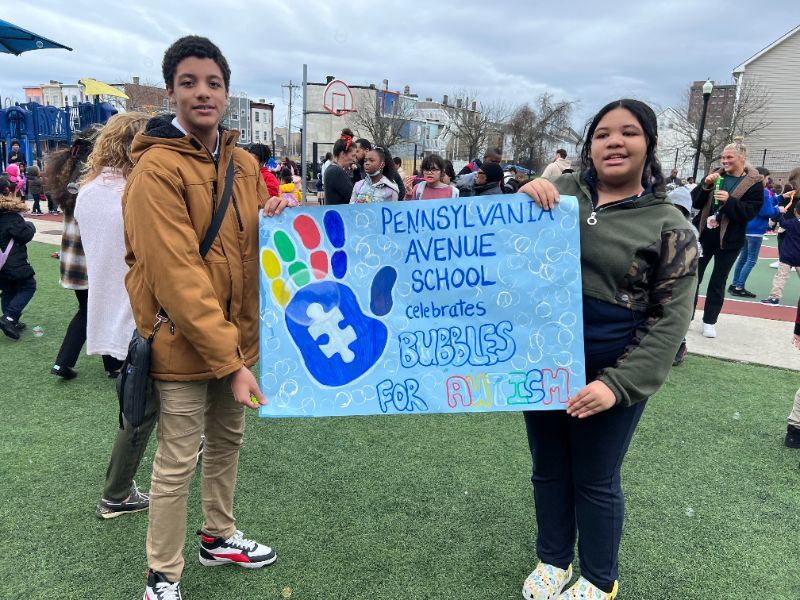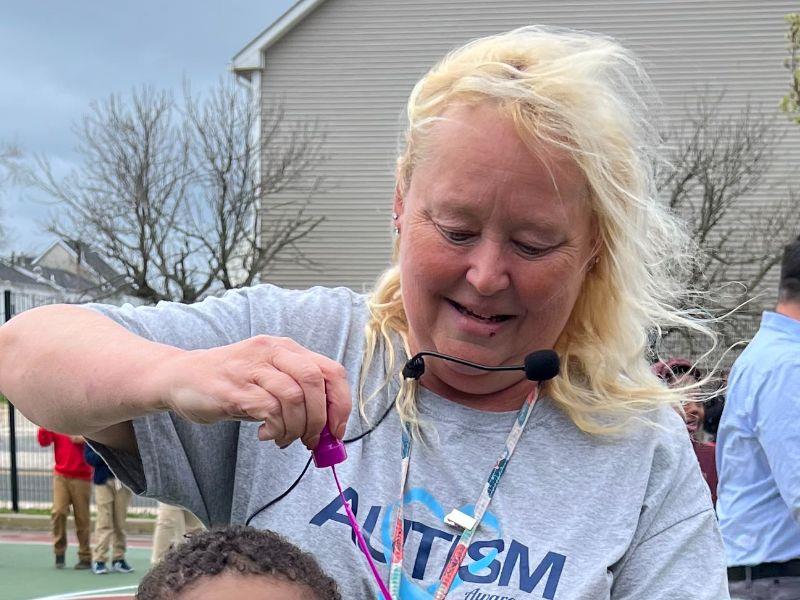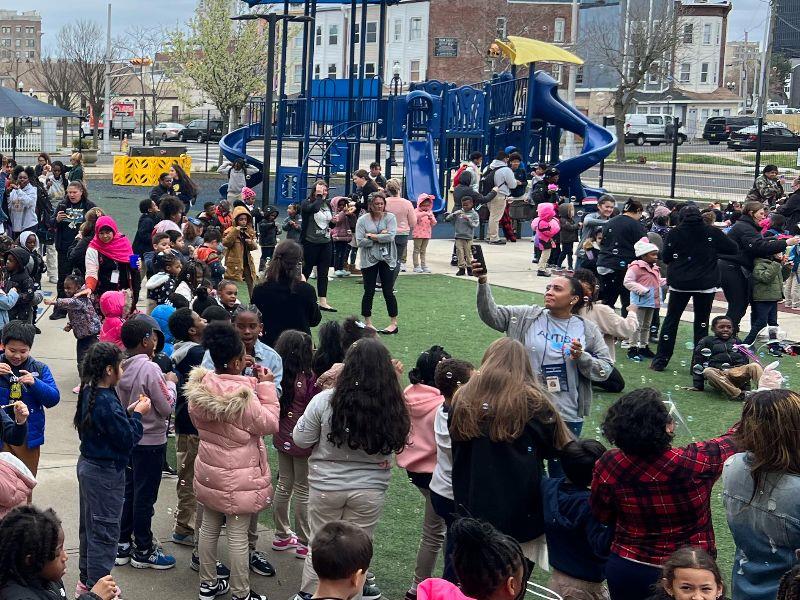Pennsylvania Avenue School Blows Bubbles for Autism Awareness Month

Students hold a Bubbles for Autism sign at the Pennsylvania Avenue School.
ATLANTIC CITY — Pennsylvania Avenue School students took time on Thursday, April 11, 2024, to blow bubbles for Autism Awareness Month.
Sandy Gehringer, the Kindergarten - 1st grade teacher who organized Bubbles For Autism, said it shows children with autism that their school community supports them.
“Blowing bubbles helps with their focus, speaking and sensory input,” Gehringer said. “It’s highly motivating.”
Autism Awareness Month is an annual event that takes place every April to promote awareness, acceptance, and advocacy for people with autism spectrum disorder (ASD). ASD is a developmental condition that affects how people communicate, interact and behave. ASD is not a disease or a defect, but a neurodiversity that makes people different and unique. Autism Awareness Month also encourages people to support the autism community, by donating, volunteering, or learning more about autism.
The Atlantic City Public Schools system’s autism instruction program is primarily housed at the Pennsylvania Avenue School with approximately 40 students and six dedicated classrooms located there. However, some students with autism receive instruction at other locations.
“We do have a growing population of children with autism in Atlantic City,” Gehringer said. “People know Atlantic City has a wonderful program and that attracts people to bring their children here.”

Sandy Gehringer, who is a Kindergarten - 1st grade teacher, organized the Bubbles for Autism celebration at Pennsylvania Avenue School.
What is Autism?
Autism is a spectrum disorder, which means that it affects people in different ways and to different degrees. Some people with autism may have mild symptoms and can live independently. Others may have severe impairments and need constant support and care.
According to published reports, there is no one cause or cure for autism, but it is believed to be influenced by a combination of genetic and environmental factors.
Some of the common characteristics of autism include:
- Difficulties with social communication and interaction, such as making eye contact, understanding body language, expressing emotions, or initiating and maintaining conversations.
- Restricted and repetitive patterns of behavior, such as following routines, having specific preferences, or engaging in stimming (self-stimulation behaviors like rocking, flapping, or spinning).
- Sensory sensitivities or differences, such as being over-or-under responsive to sounds, lights, smells, tastes, textures, or touch.
- Cognitive differences, such as having exceptional memory, attention to detail, or creativity, or having challenges with things such as abstract thinking.
People with autism may also have other conditions occurring simultaneously, such as anxiety, depression, ADHD, dyslexia, epilepsy, or intellectual disability.
“First and foremost, it presents as a lack of communication,” Gehringer said. “Typically, it’s frustrating because they can’t communicate their needs.”
At the Pennsylvania Avenue School, children learn to communicate through picture exchange books, sign language and even communication devices such as an iPad.
“It’s a little bit of everything,” Gehringer said. “Their language is developing.”
Gehringer said the key to helping children with autism succeed is identifying the disorder early. The Atlantic City Public Schools autism program supports students from Pre-kindergarten through high school. Classrooms generally have a teacher and a paraprofessional. Additional support includes registered behavior technicians, speech therapists and physical therapists. Students are also supported by the child study team.
“It takes the whole community,” Gehringer said. “It’s built on collaboration for greater success.”
Gehringer said students receive instruction on how to process their feelings, how to self-regulate and learn other life skills, because once students go home, some parents don’t have additional support.
“The ultimate goal is to get them to their least restrictive environment,” Gehringer said.
How to Support People with Autism?

The Pennsylvania Avenue School yard was awash with bubbles on Thursday, April 11, 2024, in honor of Autism Awareness Month.
People with autism are not broken or less than, they are just different and need understanding and acceptance. Here are some helpful hints for dealing with people with autism:
- Be respectful and compassionate. Treat people with autism as individuals, not as labels or stereotypes. Recognize their strengths and abilities, not just their challenges and limitations.
- Be patient and flexible. Communicate clearly and simply and give people with autism time to process and respond. Avoid sarcasm, idioms, or metaphors that may be confusing. Be prepared to adapt to their needs and preferences and respect their boundaries and choices.
- Be supportive and inclusive. Provide people with autism with the appropriate accommodations and resources they need to succeed and thrive. Involve them in decision-making and planning, especially when it is directly related to them and value their opinions and feedback. Celebrate their diversity and contributions and include them in social and community activities.

